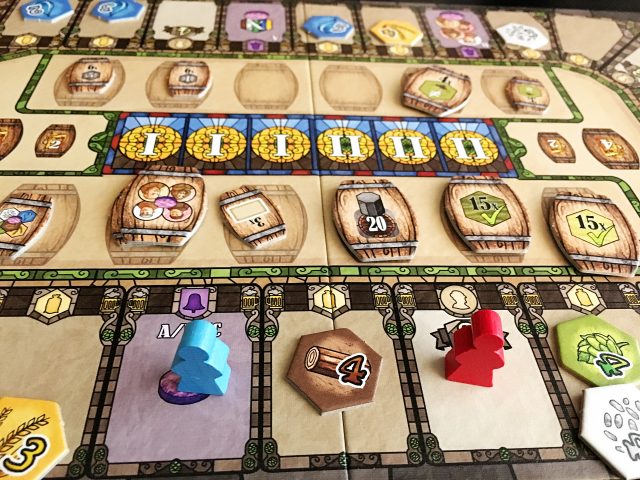The name of a game, like the name of a book, movie, or album, can tell you everything or nothing about what you’re about to experience. The best of them put you into the mood or situation of the game just by saying their name. Diplomacy. Monopoly. I’m the Boss! Arkham Horror. Can’t Stop. Twilight Struggle. Heck, even The Settlers of Catan, for all its faults, at least has a title which hints that you’re going to be a pioneer in a strange land.
But in general, Euros are notorious for having bland, vague names, betraying the fact that their themes are pasted onto the gameplay. Small World. Splendor. Kingdoms. (Knizia is a repeat offender.) A common idea is to name the game after a specific place, thus lending an air of adventure and exoticism to a game which in all actuality could be set anywhere. Goa. Puerto Rico. Strasbourg (in fact, many Feld games).
 Don’t get me wrong; all the games I’ve mentioned are great games, or at least well-loved classics. And there are lots of bum games with great titles. I just wanted to point out that in at least some cases the inventiveness of a designer ends once the design is perfected.
Don’t get me wrong; all the games I’ve mentioned are great games, or at least well-loved classics. And there are lots of bum games with great titles. I just wanted to point out that in at least some cases the inventiveness of a designer ends once the design is perfected.
Now, whoever came up with the title of the recent Eggertspiele release Heaven & Ale tried to switch things up by taking the “clever” route and giving the name a punny title. But at least for me they were too clever by half because I didn’t even catch the pun until I opened the box and saw the French rules with the title “Le Bien et le Malt”. I’m no judge but I think that’s a pretty poor pun even in French. But that’s when I realized the English title was also trying to be funny—try saying it with a French or cockney accent and the penny will drop.
Honestly, does it matter all that much that Heaven & Ale is a groan-inducing pun? No. It’s a very good game. It’s just a missed opportunity; a better name would have served the game better.
I’ve been surprised by several of the comments on BGG that Heaven & Ale is a streamlined and straightforward game. Maybe this is true for experienced players, but definitely not for neophytes. This is not a gateway game, folks, despite the warm stained-glass-themed graphic design. This is a game of multiple difficult decisions at every turn, which should not be surprising given the designer is Michael Kiesling, who along with Wolfgang Kramer designed several AP-inducing classics such as Java, Tikal and Torres. On his own he has produced front-rank games like Vikings and the just-released Azul, which has already captured the top spot on BGG’s all-time Abstract Games list. Now he’s teamed up with Andreas Schmidt, who is known for much lighter fare like Polterfass to bring us this game about monks making beer.
 Heaven & Ale is about getting the game’s many systems working in your favor, and as quickly and efficiently as possible, because you really don’t have time on your side–3, 4, or 6 rounds depending on the number of players.
Heaven & Ale is about getting the game’s many systems working in your favor, and as quickly and efficiently as possible, because you really don’t have time on your side–3, 4, or 6 rounds depending on the number of players.
The main mechanic is a rondel-type system as used in games like Francis Drake. Each round you will move your guy around a large oval track, your action depending on where you land. You can move forwards as much as you like, but you can never move backwards, and once you return to the start, you are out of actions for the round. So every round you need to map out your strategy–keeping in mind that everyone else will be doing so, too.
Actions include buying resource or monk tiles and adding them to your personal player board, taking a disc to score and activate tiles you’ve played, and claiming barrel-shaped Goal tiles from the central board (first-come, first-served).
Each action entails another layer of decision-making and trade-offs. Buy big-value resource tiles at higher cost, or spend the same amount on more lower-value tiles, which cover more real estate more quickly?.Place on the sunny side of your farm (at double cost) to boost your resources, or on the shady side to gain income (and money is tight in this game? Go for a high Brewmaster score, with more favorable endgame multipliers, or bank on extra bonus activations which will raise your resource levels? And don’t forget those Goal tiles–even if they’re not multiplied at game’s end they can add up to quite a bit of VP’s, especially with 2 or 3 players.
You can see that despite the fact that the basic mechanics are quite straightforward there’s a lot going on underneath the hood. There are no obvious strategies, and every game is different because each round’s tiles are randomly picked.
Heaven & Ale does pack a lot into a relatively short playing time–though as for many Kiesling/Kramer designs you may want to play this one with a timer to speed things up. The many interlocking mechanisms and paths to victory keep the game fresh and free from simple optimization. In the end, though, does it really have anything to do with monkish beer-making? No. Does that detract from it being a good, challenging game? In my opinion, no. It remains to be seen, though, whether Heaven & Ale has the originality to give it staying-power in the current crowded field of tabletop gaming.
Rondel in Francis Drake?